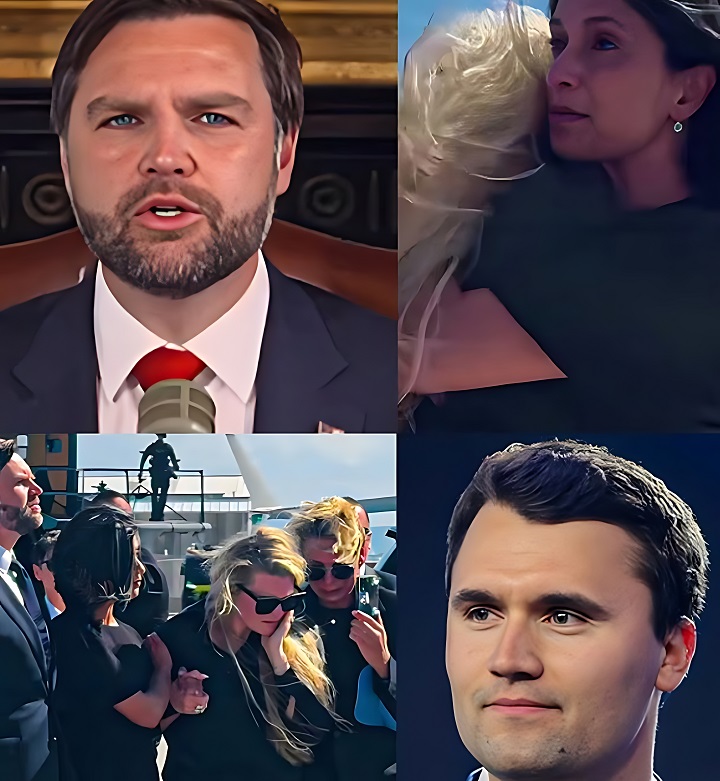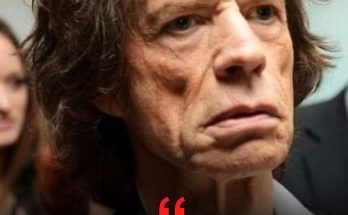In the shadow of Utah’s jagged peaks, where the air still carries the crisp bite of early fall, a single gunshot shattered the fragile illusion of civility in American politics. It was September 10, 2025, just days before the nation would pause to honor the fallen heroes of another era, when Charlie Kirk—31-year-old firebrand, co-founder of Turning Point USA, and the unyielding voice of a conservative youth movement—took the stage at Utah Valley University. The event, a raucous rally billed as “Awakening the Next Generation,” pulsed with the energy of hundreds of college students waving red, white, and blue flags, chanting slogans that echoed Kirk’s relentless crusade against what he called the “woke tyranny” gripping campuses across the country.
Kirk, with his trademark tousled hair and piercing blue eyes, had just launched into a tirade against “radical left indoctrination” when the unthinkable happened. Seated casually on a stool, mid-sentence about the perils of government overreach, a bullet tore through the air from the shadows of the auditorium’s upper balcony. It struck him in the side of the neck, a clean, lethal path that severed life from a man who had built an empire on words alone. Chaos erupted—screams pierced the hall, students trampled over chairs in panic, and Kirk slumped forward, his notes fluttering to the floor like discarded dreams. First responders swarmed the stage, but by the time they reached him, the spark in those eyes had dimmed. Charlie Kirk, the millennial architect of MAGA’s youth brigade, was gone.
The news hit like a thunderclap, rippling from the Wasatch Front to the corridors of power in Washington. President Donald Trump, fresh from a cabinet meeting, addressed the nation in a somber video from the Oval Office that evening. “Charlie was a warrior for truth, a patriot who woke up a generation to the threats we face,” Trump said, his voice gravelly with uncharacteristic restraint. “This heinous act—let’s call it what it is: an assassination—will not silence us. It only makes us louder.” He pinned the blame squarely on the “radical left,” citing years of inflammatory rhetoric that had painted Kirk as everything from a “Nazi enabler” to a “threat to democracy.” Trump vowed a posthumous Presidential Medal of Freedom for Kirk, a gesture that felt both triumphant and tragic.

But behind the headlines and the hashtags—#JusticeForCharlie trending worldwide with millions of posts—the real heartbreak unfolded in quiet, intimate moments far from the cameras. Erika Kirk, the 36-year-old former Miss Arizona and devoted wife of four years, was thrust into a nightmare no one could prepare for. The couple had met in 2018 at a conservative fundraiser in Phoenix, where Erika’s poise and sharp wit caught Charlie’s eye amid a sea of suits and stump speeches. She was a rising star in her own right, a podcast host and advocate for family values, but it was Charlie who swept her off her feet with his boundless energy and unshakeable faith. They married in a sun-drenched ceremony in 2021, vowing to build a legacy of love and liberty. By 2025, their family had grown to include two bright-eyed miracles: a three-year-old daughter, Hanna, with her father’s mischievous grin, and a 16-month-old son, Asher, whose giggles could melt the iciest debate stage.
Erika was in Arizona that fateful afternoon, coordinating a Turning Point event for high schoolers, when her phone buzzed with the impossible. A colleague’s voice, trembling: “Erika… it’s Charlie. He’s been shot.” The world tilted. She raced to the airport, boarding a private jet with Turning Point staff, her mind a whirlwind of prayers and denials. By the time she landed in Orem, Utah, the hospital had already pronounced him dead. She collapsed into the arms of a chaplain, whispering, “Not him. Not now. We have so much left to do.” Their children, blissfully unaware, were with Erika’s parents in Phoenix, playing with blocks and dreaming of bedtime stories their father would never read again.
Word of the tragedy spread like wildfire through conservative circles, but it was Vice President JD Vance who stepped into the fray with a personal resolve that transcended politics. Vance, 40, the Ohio senator turned unlikely VP—author of Hillbilly Elegy, Yale Law grad, and Trump’s shrewd running mate—had forged a deep bond with Kirk over years of shared stages and strategy sessions. Kirk had been one of the first to champion Vance for the ticket, texting allies in 2024: “JD’s the future. He’s got the grit and the grace.” When the shooting broke, Vance was in a West Wing briefing, his phone lighting up with frantic messages. He excused himself, face ashen, and within hours, Air Force Two was wheels-up, bound for Salt Lake City.
The flight back to Phoenix on September 11 would become a tableau of raw American grief, etched into the nation’s collective memory. Vance insisted on accompanying Erika and the casket, a mahogany box draped in the Stars and Stripes, its weight a stark reminder of promises unfulfilled. National Guard honor guards lifted it aboard with solemn precision, while Erika, clad in a simple black dress, clutched a rosary her husband had given her on their anniversary. Her children, too young to grasp the void, toddled nearby, Hanna tugging at her mother’s hem with questions about “Where’s Daddy’s game?”
As the plane hummed westward, the cabin became a sanctuary of shared sorrow. Usha Vance, the poised Second Lady—a biotech patent lawyer of Indian descent who had captured hearts with her quiet strength during the campaign—sat beside Erika, their hands intertwined in a grip that spoke volumes. Usha, mother to three young children of her own, understood the terror of sudden loss in ways few could. She and JD had navigated their own public life with grace, balancing the spotlight’s glare with family dinners and bedtime rituals. Now, in this airborne vigil, Usha became Erika’s anchor. They spoke in hushed tones, the roar of engines fading into the background, as Erika poured out her fears. “How do I do this without him?” she whispered, tears carving paths down her cheeks. Usha listened, then shared stories of resilience from her own immigrant roots—tales of grandmothers who rebuilt after partitions and famines.
But the moment that would later break Vance—and millions listening—was one Erika broached with trembling vulnerability. As the plane descended toward Phoenix Sky Harbor, she turned to Usha, her voice barely audible over the hum. “Usha… how do I tell them? Hanna and Asher… how do I explain that their father’s gone? That he was taken from us?” Usha paused, her dark eyes welling, and drew Erika closer. “You tell them with love,” she said softly. “You hold them close and say Daddy was a hero, that he loved them more than anything, and that love doesn’t end. It grows, even in the hurt.” Erika nodded, absorbing the words like a lifeline, but the weight of them lingered, a mother’s impossible burden.
Vance, seated across the aisle reviewing briefing notes to steady his nerves, caught fragments of the exchange. He worried Erika might shatter entirely, her frame so slight against the enormity of loss. Later, as they deplaned under a relentless Arizona sun, the scene unfolded like a funeral procession in slow motion. Usha and Erika emerged first, arms linked, sunglasses shielding eyes red from crying. Vance followed, his suit rumpled, helping the guards lower the casket onto the tarmac. A crowd of supporters had gathered beyond the barriers, waving signs that read “Charlie Lives On” and “MAGA Eternal,” their cheers a mix of defiance and devastation. Erika waved faintly from the passenger seat of the hearse, rosary in hand, as it carried her husband toward Hansen Mortuary Chapel in Phoenix. In that instant, the Vances weren’t just political allies; they were family, bound by a tragedy that stripped away the veneer of power.
The days that followed blurred into a haze of memorials and manhunts. The FBI, offering a $100,000 reward, zeroed in on Tyler Robinson, a 28-year-old former student radicalized online, whose manifesto railed against “fascist influencers poisoning youth.” Captured within 48 hours in a Provo motel, Robinson faced federal charges, his arraignment set for September 16 amid whispers of a broader plot. Turning Point USA, the juggernaut Kirk built from a dorm-room idea into a $50 million conservative powerhouse, refused to falter. Erika addressed staff in a tear-streaked video on September 12: “If you thought Charlie’s mission was powerful before, you have no idea what’s coming. We’ll make this the biggest force this nation has ever seen—for him, for our kids, for America.” The organization pressed on with campus tours and the podcast that bore his name, syndicated on over 200 stations.
Yet it was Vance who gave voice to the unspoken agony, channeling it into a tribute that would rally the faithful and indict the divide. On September 15, from the White House’s Roosevelt Room—remade into a makeshift studio—he hosted “The Charlie Kirk Show,” the slot Kirk had commanded three hours a day. Flanked by Kirk’s longtime producer Andrew Kolvet and guests like Jack Posobiec and Tyler Bowyer, Vance took the mic at noon ET, his voice steady but laced with emotion. “Charlie was more than a friend; he was a brother in this fight,” he began, invoking their shared rallies from Ohio barns to Arizona arenas. He recounted Kirk’s role in his VP push, the late-night texts plotting America’s revival.
Then came the gut punch, delivered with a pause that hung heavy in the airwaves. “As we floated Charlie’s casket off Air Force Two, I worried Erika would collapse with grief,” Vance said, his Midwestern drawl cracking. “I’ve never been prouder of my wife than in that moment, holding Erika in her darkest hour.” He leaned forward, eyes glistening. “I asked Usha what Erika had said earlier, in a private moment. And my wife told me… Erika asked her for advice. On how she should tell her beautiful kids that their father… is no longer with us.” The studio fell silent, the weight of those words landing like another bullet. Vance’s fist clenched the table. “And as she was doing it—while a mother faced that horror—there were people dancing on that father’s grave.”
The line ignited fury and sorrow in equal measure. Vance didn’t name names, but the implication was clear: online videos had surfaced almost immediately after the shooting, showing protesters outside the auditorium—anti-fascist activists, by their black bloc attire—chanting “One less bigot” and linking arms in mocking jigs. Clips spread on fringe platforms, captioned with glee: “The revolution eats its own.” Vance hammered home the hypocrisy: “This isn’t just politics; it’s poison. Charlie fought for faith, family, freedom—and for what? To have his legacy trampled while his widow picks up the pieces?” He called for unity, but laced it with a warning: “We’ll honor him by redoubling our resolve. No more dancing on graves.”
The episode broke records, streamed live on X and Rumble to over 5 million viewers. Listeners flooded hotlines with stories of Kirk’s impact—a Texas teen who credited him for ditching socialism, a Florida mom whose son volunteered after a Turning Point summit. Erika watched from Phoenix, her children napping nearby, and later texted Vance: “You spoke for us all. Charlie’s smiling.” A memorial loomed on September 21 at State Farm Stadium in Glendale, where Trump promised to speak, joined by thousands expecting a sea of red hats and resolve.
In the quiet aftermath, as Erika tucked Hanna and Asher into beds that still smelled of their father’s cologne, the weight of Vance’s words lingered. She had faced the void, guided by Usha’s wisdom, and emerged not broken, but forged anew. Charlie Kirk’s death wasn’t just a loss for conservatives; it was a mirror to America’s fractures—where passion ignites progress but can also consume lives. Yet in the handclasp on Air Force Two, the whispered counsel amid grief, there gleamed a flicker of humanity: women bridging worlds, mothers arming each other against the storm. As the nation hurtles toward midterms shadowed by suspicion, Erika’s vow echoes: the mission endures. Charlie’s voice may be silenced, but his fire burns on—in podcasts, in protests, in the unbreakable bond of those left to carry the torch.



